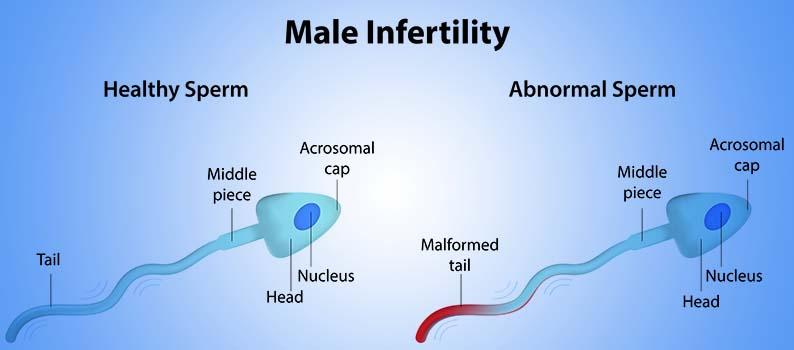In the silent corridors of human health, where whispers of concern often go unheard, lies the intricate tale of male infertility—a subject cloaked in mystery and misconception. As couples embark on the journey to parenthood, the spotlight often falls on women, leaving the male counterpart shrouded in the shadows of assumption. Yet, the role of male fertility is as pivotal as it is profound. Recognizing the early signs of male infertility is not merely a medical endeavor but a crucial step towards understanding and addressing a deeply personal challenge. This article delves into the subtle signals and overlooked indicators that can illuminate the path to early intervention, unraveling the enigma of male fertility with empathy and insight. Join us as we explore the delicate balance of biology and hope, shedding light on a subject that deserves attention and understanding.
Understanding the Subtle Symptoms of Male Infertility
Male infertility often presents itself through subtle signs that can easily be overlooked. While some symptoms may not be immediately obvious, they can still impact fertility. Understanding these indicators can lead to early detection and treatment. Here are some signs to watch for:
- Changes in Sexual Desire: A decrease in libido can be linked to hormonal imbalances, which may affect fertility.
- Problems with Erection or Ejaculation: Difficulty maintaining an erection or issues with ejaculation can point to underlying health concerns that may influence sperm production.
- Pain or Swelling in the Testicular Area: This could be indicative of conditions such as varicocele or infections that impact fertility.
- Unusual Breast Growth: Known as gynecomastia, this can be a sign of hormonal changes affecting fertility.
- Reduced Facial or Body Hair: This might suggest chromosomal or hormonal abnormalities that could be influencing fertility.
These symptoms may not always indicate infertility but should be addressed with a healthcare provider to rule out any potential issues. Recognizing these subtle signs early can lead to more effective treatment and a better understanding of one’s reproductive health.

Exploring Common Medical Conditions Linked to Infertility
Infertility can often be linked to a range of underlying medical conditions that affect male reproductive health. Hormonal imbalances, such as low testosterone levels or issues with the pituitary gland, can disrupt sperm production and lead to fertility challenges. Additionally, genetic disorders like Klinefelter syndrome, which results in an extra X chromosome, can impair testicular function and reduce fertility potential.
Infections and structural issues can also play a significant role. Chronic infections, such as sexually transmitted infections, can lead to blockages or scarring in the reproductive tract. Similarly, varicoceles, which are enlarged veins within the scrotum, can affect the temperature regulation of the testes, negatively impacting sperm production. Moreover, lifestyle factors, including excessive alcohol consumption, smoking, and obesity, may exacerbate these medical conditions, further contributing to infertility.

Lifestyle Changes and Their Impact on Male Reproductive Health
In today’s fast-paced world, making conscious adjustments to one’s daily habits can profoundly affect overall health, including reproductive health. Many lifestyle changes can lead to improvements in male fertility. Dietary choices are a primary factor; consuming a balanced diet rich in antioxidants, omega-3 fatty acids, and essential vitamins can enhance sperm quality. Furthermore, regular exercise not only aids in maintaining a healthy weight but also boosts testosterone levels, which is crucial for sperm production. However, it’s important to balance exercise, as excessive physical exertion can have adverse effects.
Another significant aspect is managing stress levels. Chronic stress can lead to hormonal imbalances that negatively impact sperm count and motility. Engaging in mindfulness practices such as meditation, yoga, or even simple breathing exercises can help mitigate stress. Additionally, reducing exposure to environmental toxins, such as pesticides and industrial chemicals, is vital. These substances can disrupt endocrine function and harm sperm health. Here are some lifestyle changes that can positively impact male reproductive health:
- Incorporating a nutrient-rich diet with plenty of fruits, vegetables, and whole grains.
- Ensuring adequate sleep and establishing a regular sleep schedule.
- Avoiding smoking and excessive alcohol consumption.
- Using protective gear when dealing with harmful substances.
- Maintaining a healthy body weight through a balanced lifestyle.
By integrating these lifestyle adjustments, men can take proactive steps toward enhancing their reproductive health, potentially improving fertility outcomes and overall well-being.

When to Seek Professional Help: Navigating Fertility Concerns
Understanding when to seek professional help can be crucial for addressing fertility concerns effectively. If you’re noticing any unusual symptoms or patterns, it might be time to consult with a healthcare provider. Some key indicators to watch for include:
- Changes in sexual desire or function, which could be indicative of hormonal imbalances.
- Problems with ejaculation or small volumes of fluid, possibly pointing to reproductive system issues.
- Swelling, pain, or lumps in the testicular area, which should be evaluated promptly.
- Persistent respiratory infections, which may be linked to underlying genetic conditions affecting fertility.
Beyond these signs, it’s important to consider your overall health and lifestyle. Factors such as exposure to certain chemicals, excessive alcohol consumption, and smoking can all impact fertility. If you’re experiencing difficulty conceiving after a year of regular unprotected intercourse, seeking professional guidance is a wise step. Remember, early intervention can provide more options and better outcomes.








